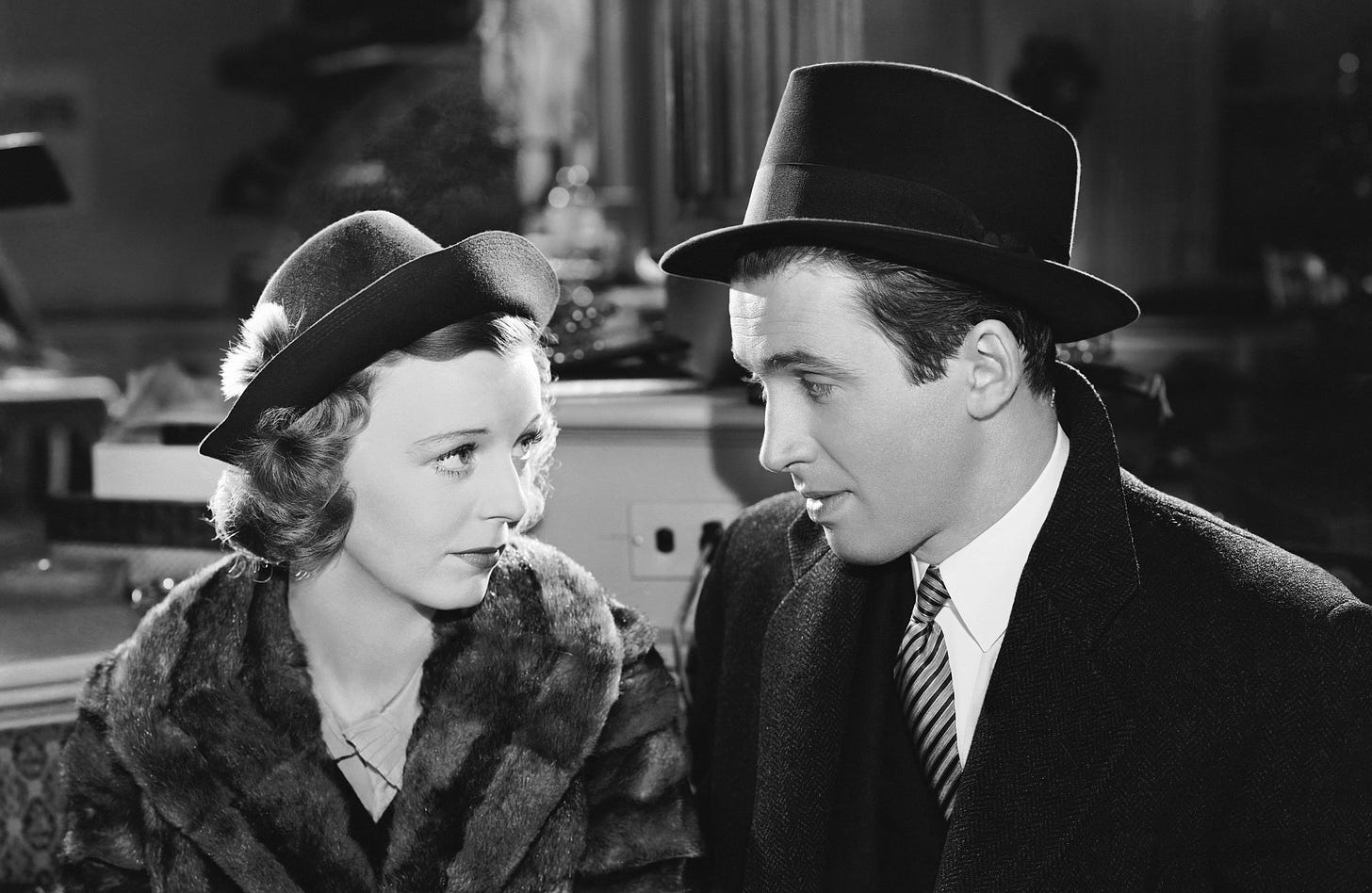100 Movies Every Catholic Should See #93: The Shop Around the Corner (1940)
Directed by Ernst Lubitsch. Starring Margaret Sullavan and James Stewart
“There might be a lot we don't know about each other. You know, people seldom go to the trouble of scratching the surface of things to find the inner truth.” — Alfred Kralik
How true of an utterance from Ernst Lubitsch’s 1940 film. Is it fair to say that as the years pass, different generations slowly become fearless and go out of their way to find that inner truth? To scratch the surface of things in different aspects of life, and reveal to themselves and others the reality that some might want to keep hidden? Joy, despair, love and suffering are irremovable truths that compose life, and they remain difficult to express verbally. Why is that? Maybe because these components all stem from a definite inner truth who is beyond our own grasp. The pinnacle of inner truth who happens to be reborn and celebrated every 25th of December. The twelfth month of each year welcomes folks to prepare for the coming of Christmas. Whether that be shopping for the next gift, seeking time off work, and planning the next travel itinerary, the Advent season not only proves itself to be a busy and stressful period, but a holy and sacred one above all; a time when that pinnacle of inner truth offers everyone another chance at life, inviting all to be reborn. And as this sort of chance remains difficult to express in words, it can always be witnessed in forms of art, say for instance the art of film. If someone were to ask you what movie comes to mind when Christmas comes to town yet again, a variety of answers may be presented like Home Alone or A Christmas Story. Frank Capra’s 1946 film, It’s a Wonderful Life, for instance, remains the biggest linchpin in the hearts of many, including mine. In many scenes does my heart repeatedly find warmth and my eyes find tears like in one from the movie’s final minutes when James Stewart cries to his guardian angel, praying in raw agony:
Clarence! Clarence! Help me, Clarence! Get me back! Get me back, I don’t care what happens to me! Get me back to my wife and kids! Help me, Clarence, please! Please! I want to live again. I want to live again! I want to live again… please, God. Let me live again.
The film never fails in revealing to its protagonist the path to joy and rebirth. It truly stems from a Divine power and… What’s that, now? Oh! Yes, that’s right, excuse my little detour! You, dear reader, aren’t here to peruse over It’s a Wonderful Life! Don’t you worry! Alright, let’s take an expedition six years into the past, along the many rolls of Kodak film, and find ourselves in one of Hungary’s humble little stores where life’s delicacies of joy, despair, love and suffering are baked and offered for the next employee or customer. Everyone talks about Capra’s 1946 classic, but it’s time that this precise screen gem finds its way to more recognition as not only a Christmas favorite, but as a genuine piece of art to stand on its own. Also starring the ideal everyman James Stewart, Ernst Lubtisch’s The Shop Around the Corner is another splendid and sincere tale to revisit for all. By way of the delicately arranged brilliance in Samson Raphaelson’s script, Lubitsch visualizes the story of employees at Matuschek and Company, a leather goods shop in Budapest that is owned and operated by Hugo Matuschek (Frank Morgan). Most of the employees get along with each other, but nonetheless, the story centers itself on two individuals: the seasoned salesman Mr. Alfred Kralik (James Stewart) and the novice Ms. Klara Novak (Margaret Sullavan). Both of them cannot stand each other. Outside of work, they each happen to be falling in love with their own mysterious correspondents via handwritten letters. Little do the quarreling Alfred and Klara know the inner truth: they have been each other’s pen pals this whole time. Sooner or later one of them will know it. But… will this inner truth keep both love birds from living happily ever after? Well after all, as stated above, like George Bailey’s journey and like the Word made flesh, the inner truth should lead one to joy and rebirth. A new beginning. A new adventure.
When discussing the works of Ernst Lubitsch, there is a phrase about the famed director that has come to be known as “The Lubitsch Touch.” What is that, you may ask? For the most part, the answer cannot be settled. Rather, it remains mysterious. From sophistication to subtlety, or from poignancy to sheer bliss, individuals such as his protégé Billy Wilder have come to know this “touch” as bearing an appetite for the unexpected. As Wilder described:
It was the elegant use of the Superjoke. You had a joke, and you felt satisfied, and then there was one more big joke on top of it. The joke you didn't expect. That was the Lubitsch Touch...
That’s certainly a feature one will find in this cinematic snowy gem. But so as to not repeat the descriptions of others, the best that my brain can construe from their musings and, importantly, from the film itself is the term, “orchestration.” Upon making The Shop Around the Corner my very initial foray into the writer and director’s work, the first thought that came to mind was his effortless process of orchestrating comedy, drama, love, and romance in a ninety-nine minute film. Unlike many rom-coms or, generally speaking, the mere streaming content of now, the “Lubitsch touch” is one that omits the idea of what’s deemed as “content” and further proves itself to be an example of what’s considered art aka a glimpse at the divine. The aforementioned James Stewart-led vehicle, It’s a Wonderful Life, lovingly shows off its prevalence of the individual’s importance and his belief in providence; these would be two ingredients to define, if one might coin it, “The Capra Touch”. The sole man’s struggle and unmitigated willingness to find and believe in himself once again, plus a great dose of heavenly assistance. However, this unashamed propagation of providence isn’t really something found in Lubitsch’s work like it is in the Catholic Capra’s screen gems. Yet, that never diminishes its inclusion in art. On the other hand, Lubitsch offers an orchestration of life’s fortunes and misfortunes, and is able to consolidate and elucidate these two pricelessly, thereby showing life’s undeniable sacredness and beauty.
The Shop Around the Corner’s events mostly occur in the aforementioned store, Matuschek and Company, and it’s here where hard work, friendship, infidelity, secrets, depression, and romance are found in the story’s spirit of Christmas. All in all, Mr. Matuschek’s employees can be viewed as a loving and close knit family, carrying its own flaws, while Matuschek himself remains the store’s resilient patriarch. Supplementing the aforementioned brewing love between Alfred and Klara, amidst the inner tension, viewers will come to see the inner turmoil boiling within the boss’ personal life. His own wife is cheating on him with one of his employees. Not to mention other supporting players such as Pirovitch (Felix Bressart) only seeking to be home and provide for his wife and two young children. Furthermore, there is the excellently clever errand boy Pepi (William Tracy), waiting for his promotion to clerk. There’s an almost indescribable method to how Lubitsch takes the material and elevates it to a platform of resplendency. A platform wherein the conflicting lives of each character appear to waltz so well together, eventually leading to the inner truth revealed in both of the two main characters, James Stewart’s Alfred Kralik and Margaret Sullavan’s Klara Novak. Again, orchestration. The Lubitsch Touch. Life itself is minimized and consolidated into a little shop around the corner, leading to the eventual reveal of true love and care between two people.
But here’s something interesting about how much of life’s kaleidoscope of atomic structures is found in the little store. Such a store breathes the thick air of commercialism, which unfortunately, if one allows it, runs so rampant every December that the inner truth of the season might be watered down. Lubitsch’s film is a Christmas story, and due to it being a tale occurring amidst the snow of a wintry Noël, the wise filmmaker does not fail at presenting how reverent of a time it is that life itself can’t be taken for granted. Effortless comedy proceeds from the very beginning and to the very end, and yet it never removes the integrity of the narrative, as humor can very much be embedded in life’s fortunes and misfortunes. A perchance to suicide is touched upon about as darkly as Lubitsch can take it, and one might think this will turn the whole tale upside down, but it does not. The near instance of a character’s death happens to be what brings everyone closer together. Certain characters halt petty disagreements while one not only gets his job back but is promoted to manager. Another employee receives his promotion, and importantly yet again two people uncover, right in the store, the feelings they have for each other.
As the film continues, it becomes easier for characters, especially Alfred and Klara, to scratch the surface of things and find the inner truth. The inner truth not only about themselves, but for one another. The Lubitsch touch isn’t mere orchestration of these components that make life truly wondrous, but it’s the melodic play of events that he constructs in order to prove how worthwhile breathing this air called life is. Therefore, the spirit of Christmas, as it covers Matuschek and Company and the streets of Budapest in fluffy snow, comes to show the holy and sacred inner truth of life itself: it is a road for everyone, leading all to joy and rebirth. As we continue on this season of Advent, may we all find ourselves and our loved ones on that road, supporting each other every step of the way. Merry Christmas and Happy New Year!






